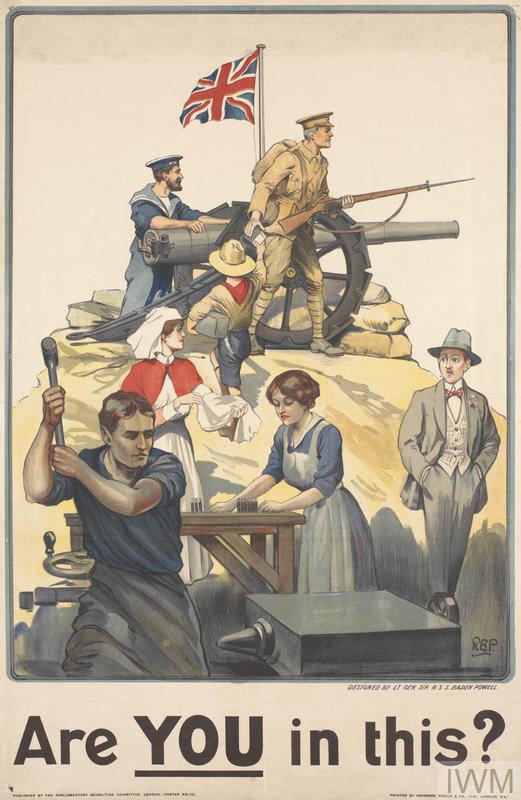
A World War I recruitment poster asks ordinary citizens to get into the fight. Imperial War Museums
‘Are You in This?’
If so many Americans believe Russia is an ally, China is a good business partner, and terrorism isn’t worth fighting anymore, how can the United States be counted on for global security?
LONDON — In the telling of the impressively interactive Imperial War Museum, World War I began as something of a sideshow spectacle for Britain’s rich and comfortable and disengaged. Just a few decades removed from the peak of empire, the country’s richest 1 percent owned nearly 70 percent of the wealth. Recruiting posters advertised war as a nearby adventure for commoners: “There’s room for you!”
But within years, the urgency of total war became clearer. Later posters show Britons from all walks of life lining up to serve and contribute to the fight. Eventually, every citizen was asked to sacrifice, to limit the very food they ate, because the British Isles were in danger of starvation. “Save the wheat and help the fleet!” one poster reads. “The kitchen is the key to victory. Eat less bread!”
The poster that struck me most depicts an artilleryman and a sailor preparing for battle atop a rock. Below them, a Boy Scout hands up a tin (the poster was designed by founder Lord Robert Baden-Powell), a nurse prepares a dressing, a woman stacks ammunition, and a man swings a hammer on an anvil. Off to the side stands a clean-looking man in a three-piece suit and fedora, the luxury of a cigarette between his lips, watching them. Doing nothing. The message is at the bottom: “Are YOU in this?”
Imagine that question being asked of Americans today. It’s the very question behind the American Readiness Project from Defense One and the Center for a New American Security, or CNAS. In the United States, most Americans don’t even know what “this” is. They’re standing apart from those in the fight — broadly speaking, the military and defense civilians, the intelligence community, the defense industry, foreign-policy academia.
The next day, as I flew home from London, Defense One reported that a recent poll found that 28 percent of Americans believe Russia is an ally of the United States. That’s up almost 10 points in a year. Meanwhile, 36 percent of those surveyed — and nearly half of military respondents, and half of all respondents under age 30 — said China was a U.S. ally. More than one-fifth of respondents said Syria was an ally. (Neither is.) People were evenly divided on whether Turkey or Saudi Arabia are allies. (They are, and Turkey is a treaty ally in the NATO alliance.)

This Reagan Foundation survey is just the latest evidence of a growing gap between basic facts and public perception when it comes to national security.
But there is also a growing confidence gap between ordinary Americans and national security leaders. The latter want to keep U.S. troops deployed and ready to respond if needed (which Americans support) and fighting in Afghanistan and the Middle East (which Americans increasingly do not support.)
When presidential candidates say they are through with “forever wars,” they draw enthusiastic applause. America’s front-line ambassador to Syria says that shows “total ignorance of what’s going on in the world today.”
Americans who see China as a source of cheap goods or lucrative investment opportunities don’t see that it has become a threat to democracy and American hegemony. The NBA censored its own players from supporting human rights and stifled criticism of its business partner, China. And Google employees defy their own leaders, as Silicon Valley’s resistance to the U.S. military continues to alarm the Pentagon’s Joint Chiefs of Staff.
Amazon’s Jeff Bezos reiterated an alarm over the weekend. “My view is, if big tech is going to turn their back on the Department of Defense, this country is in trouble,” Bezos told security leaders at the annual Reagan Defense Forum on Saturday. “That just can’t happen.”
Rep. Liz Cheney, R-Wyo., echoed the sentiment. “I am concerned that we are seeing groups, frankly, in both parties come together in a very dangerous way around isolationist principles,” she said at the forum. “As leaders, we impact this. As leaders we have to be in a position that we are very clear about the critical role that America has played” in global security.
And Sen. Tammy Duckworth, D-Ill., asked: “This is a point in our nation, I think, where we choose: Do we continue to lead?”
Meanwhile, President Donald Trump continues to praise dictators, including China’s Xi Jinping and Turkey’s Recep Erdogan, while sparring unnecessarily with leaders of U.S. allies, such as Canada’s Justin Trudeau and France’s Emmanuel Macron. On Tuesday, Trump welcomed Russia’s Foreign Minister Sergei Lavrov back to the Oval Office. Perhaps the visit is the simply the administration’s way of keeping adversaries close, but it sends a confusing message.
If so many Americans believe Russia is an ally, China is a good business partner, and terrorism isn’t worth fighting anymore, how can the world count on the United States for global security? The United States has long benefited from allies and friends and from a leadership role that allowed it to set the terms of global interaction and trade.
When Britons were needed to fight 100 years ago, their leaders made the case and called them up, asking “Are YOU in this?” If U.S. leaders aren’t educating and recruiting the nation with a similar contemporary call to action, and with new policies for success, how can the United States be the 21st-century leader of global security? If Americans don’t even know who the enemy is, why should they be expected to fight for anything?
NEXT STORY: If Ukraine Is Impeachable, What’s Afghanistan?
